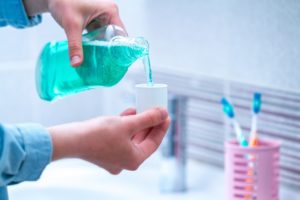 Regular checkups with a family dentist, along with brushing twice a day and flossing once, are the foundation of good oral hygiene. But most people could benefit by adding mouthwash to their daily routine as well. The only problem is that it can be overwhelming to choose the right one from the countless options at the store! The best place to start is to think about your specific oral health needs and go from there. Learn more below about the various types of dental problems and which formulas can be used to address them.
Regular checkups with a family dentist, along with brushing twice a day and flossing once, are the foundation of good oral hygiene. But most people could benefit by adding mouthwash to their daily routine as well. The only problem is that it can be overwhelming to choose the right one from the countless options at the store! The best place to start is to think about your specific oral health needs and go from there. Learn more below about the various types of dental problems and which formulas can be used to address them.
Bad Breath
Just about everyone has bad breath at some point or another. While any flavored mouthwash will make temporary improvements, you can also look for an antiseptic formula for a more long-lasting effect. These antibacterial options are designed to kill odor-causing bacteria (the source of bad breath) and may say on the bottle that they treat gingivitis, which is also caused by bacteria.
Cavities
Cavity prevention is all about strengthening your enamel, which is the tough, mineralized outer layer of your teeth. The main ingredient to look for is fluoride, which is a mineral that makes your teeth harder and more resistant to decay (somewhat like calcium makes your bones harder and more resistant to breaking).
To find this type of mouthwash, look for fluoride under the “active ingredients” on the back of the bottle or simply the word “anti-cavity.” With these formulas, it’s extra important not to rinse afterward because you want the fluoride to remain on your teeth as long as possible.
Gingivitis (Bleeding, Swollen, or Tender Gums)
Gingivitis is the first stage of gum disease and may be reversible with regular professional cleanings and good oral hygiene at home. One of the main contributing factors is bacteria and the subsequent inflammation it causes. To address gingivitis at its source, look for the words “antiseptic,” “anti-bacterial,” or that it’s specifically designed for gingivitis on the label.
Advanced Gum Disease
If gingivitis isn’t caught and treated in time, it often progresses to later stages of gum disease, which can’t be cured. However, it can be managed to keep it from getting worse. If you’re diagnosed with gum disease, a dentist may prescribe a type of mouthwash that’s specially designed to target bacteria. Usually containing chlorhexidine, it’s typically used for just 2 weeks at a time.
Still Not Sure Which Mouthwash Is Right For You?
The best way to know which mouthwash is right for you is to simply ask a dentist or hygienist at your next checkup. They can not only demonstrate brushing and flossing techniques but also recommend specific products for your needs, including toothbrushes, floss, mouthwashes and more. Also, keep in mind that there are “all-in-one” options that will give you more than one benefit.
While mouthwash certainly doesn’t take the place of brushing and flossing, it can be an excellent addition to your routine that helps your smile look and feel its best.
About the Author
As a family dentist with more than 15 years of experience, Dr. Chris Long knows that someone’s oral hygiene routine at home has a big impact on their dental health. That’s why he and his staff always provide personalized tips to help their patients be as effective as possible. If you’d like to know more about the best oral hygiene products to use or have any questions, he can be reached via his website.
